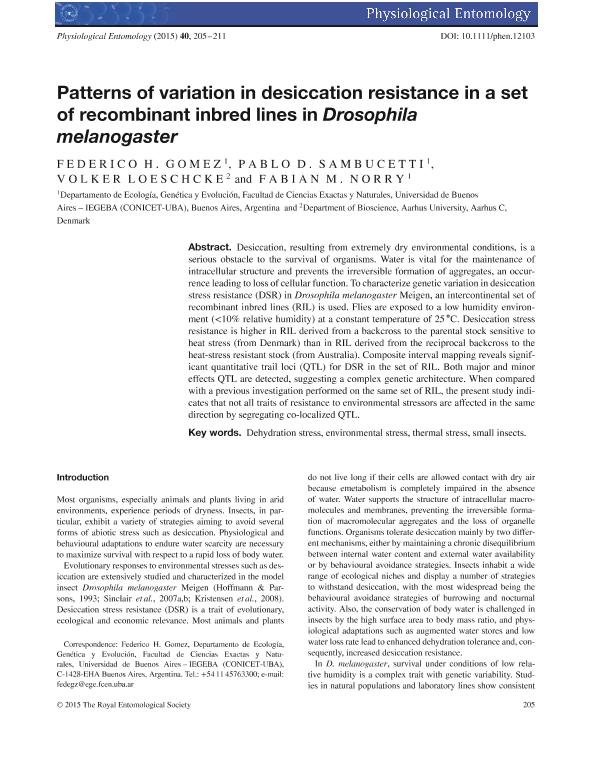Artículo
Patterns of variation in desiccation resistance in a set of recombinant inbred lines in Drosophila melanogaster
Gomez, Federico Hernan ; Sambucetti, Pablo Daniel
; Sambucetti, Pablo Daniel ; Loeschcke, Volker Helmut Otfried; Norry, Fabian Marcelo
; Loeschcke, Volker Helmut Otfried; Norry, Fabian Marcelo
 ; Sambucetti, Pablo Daniel
; Sambucetti, Pablo Daniel ; Loeschcke, Volker Helmut Otfried; Norry, Fabian Marcelo
; Loeschcke, Volker Helmut Otfried; Norry, Fabian Marcelo
Fecha de publicación:
07/2015
Editorial:
Wiley Blackwell Publishing, Inc
Revista:
Physiological Entomology (print)
ISSN:
0307-6962
Idioma:
Inglés
Tipo de recurso:
Artículo publicado
Clasificación temática:
Resumen
Desiccation, resulting from extremely dry environmental conditions, is a serious obstacle to the survival of organisms. Water is vital for the maintenance of intracellular structure and prevents the irreversible formation of aggregates, an occurrence leading to loss of cellular function. To characterize genetic variation in desiccation stress resistance (DSR) in Drosophila melanogaster Meigen, an intercontinental set of recombinant inbred lines (RIL) is used. Flies are exposed to a low humidity environment (<10% relative humidity) at a constant temperature of 25°C. Desiccation stress resistance is higher in RIL derived from a backcross to the parental stock sensitive to heat stress (from Denmark) than in RIL derived from the reciprocal backcross to the heat-stress resistant stock (from Australia). Composite interval mapping reveals significant quantitative trail loci (QTL) for DSR in the set of RIL. Both major and minor effects QTL are detected, suggesting a complex genetic architecture. When compared with a previous investigation performed on the same set of RIL, the present study indicates that not all traits of resistance to environmental stressors are affected in the same direction by segregating co-localized QTL.
Palabras clave:
DEHYDRATION STRESS
,
ENVIRONMENTAL STRESS
,
SMALL INSECTS
,
THERMAL STRESS
Archivos asociados
Licencia
Identificadores
Colecciones
Articulos(IEGEBA)
Articulos de INSTITUTO DE ECOLOGIA, GENETICA Y EVOLUCION DE BS. AS
Articulos de INSTITUTO DE ECOLOGIA, GENETICA Y EVOLUCION DE BS. AS
Citación
Gomez, Federico Hernan; Sambucetti, Pablo Daniel; Loeschcke, Volker Helmut Otfried; Norry, Fabian Marcelo; Patterns of variation in desiccation resistance in a set of recombinant inbred lines in Drosophila melanogaster; Wiley Blackwell Publishing, Inc; Physiological Entomology (print); 40; 3; 7-2015; 205-211
Compartir
Altmétricas



